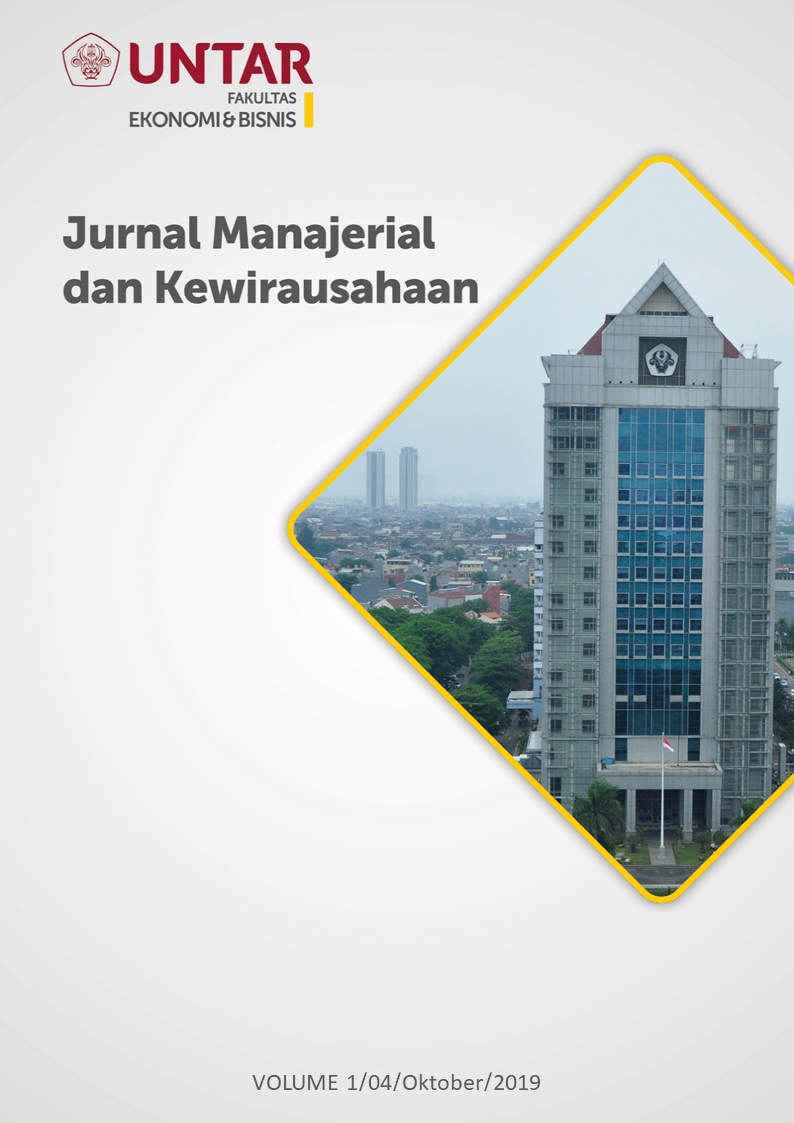Pengaruh Pendidikan Kewirausahaan Terhadap Niat Berwirausaha Yang Dimediasi Efikasi Diri Mahasiswa Manajemen
Main Article Content
Abstract
The purpose of this study is to explain the effect of entrepreneurship education to entrepreneurial intention mediated by self-efficacy of students on Management Department, Faculty of Economics, Universitas Tarumanagara. The subject of this study is 118 students of Entrepreneurship Concentration, Management Department, who have taken Building and Managing Entrepreneurship Business or Business Planning and Simulation course. Data are collected using a questionnaire. Data collected are analyzed using linear multiple regression analysis using IBM SPSS 23 software. The results of this study indicate that there is an effect of entrepreneurship education to entrepreneurial intention and self-efficacy. In addition, there is an effect of self-efficacy to entrepreneurial intention. Furthermore, the results of this study indicate that self-efficacy mediates the relationship between entrepreneurship education and entrepreneurial intention.
Tujuan penelitian ini adalah untuk menjelaskan pengaruh pendidikan kewirausahaan terhadap niat berwirausaha yang dimediasi efikasi diri mahasiswa Jurusan Manajemen Fakultas Ekonomi Universitas Tarumanagara. Subyek penelitian ini adalah 118 mahasiswa Jurusan Manajemen Konsentrasi Kewirausahaan dimana mereka sudah mengambil mata kuliah Membangun dan Mengelola Usaha Kewirausahaan atau Perencanaan dan Simulasi Bisnis. Data dikumpulkan dengan menggunakan kuesioner. Data yang dikumpulkan dianalisis menggunakan analisis regresi linear ganda menggunakan perangkat lunak IBM SPSS 23. Hasil penelitian ini menunjukkan terdapat pengaruh pendidikan kewirausahaan terhadap niat berwirausaha dan efikasi diri. Selain itu, terdapat pengaruh efikasi diri terhadap niat berwirausaha. Lebih lanjut lagi, hasil penelitian menunjukkan bahwa efikasi diri memediasi kaitan antara pendidikan kewirausahaan dan niat berwirausaha.
Article Details
This work is licensed under a Jurnal Muara Ilmu Ekonomi dan Bisnis Creative Commons Attribution-ShareAlike 4.0 International License.,/p>
References
Ajzen, I. (1985). From Intentions to Actions: A Theory of Planned Behavior. Dalam J.
Kuhl, & J. Beckmann, Action Control (11-39). Berlin: Springer.
_______. (1991). The Theory of Planned Behavior. Organizational Behavior and Human
Decision Processes 50(2), 179-211.
Aritonang R., L. R. (2007). Riset Pemasaran: Teori & Praktik. Bogor: Penerbit Ghalia
Indonesia.
Badan Pusat Statistik. (2018, 5 November). Keadaan Ketenagakerjaan Indonesia Agustus
Berita Resmi Statistik No. 92/11/Th. XXI, 1-16.
_________________. (2018). Tingkat Pengangguran Terbuka Berdasarkan Kelompok
Umur, 2015-2018 (Retrieved from: www.bps.go.id/10-3-2019).
_________________. (2019). Pengangguran Terbuka Menurut Pendidikan Tertinggi yang
Ditamatkan 1986-2018 (Retrieved from: www.bps.go.id/11-3-2019).
Bosma, N., & Kelley, D. (2018). Global Entrepreneurship Monitor: 2018/2019 Global
Report. Chile: Gráfica Andes.
Fayolle, A., Gailly, B., & Lassas-Clerc, N. (2006). Assessing the impact of
entrepreneurship education programmes: a new methodology. Journal of European
Industrial Training 30(9), 701-720.
Festiani, S. (2015, 12 Maret). Menkop Luncurkan Paket Kebijakan Pengembangan
Wirausaha (Retrieved from: www.republika.co.id/8-3-2019).
Ghozali, I. (2013). Aplikasi Analisis Multivariate dengan Program IBM SPSS 21. Edisi 7.
Semarang: Badan Penerbit Universitas Diponegoro.
Global Entrepreneurship Research Association. (2018). Global Entrepreneurship Monitor
(GEM) Global Report 2017/18. Global Entrepreneurship Research Association.
Hasan, M., Khan, E. A., & Nabi, N. U. (2017). Entrepreneurial education at university
level and entrepreneurship development. Education + Training 59(7/8), 888-906.
Hendratno, E. T., & Fitriati, R. (2015). The Study of Indonesia's Readiness to Cope with
Demographic Bonus: A Review of Population Law. Journal of Indonesian
Economy and Business 30(3), 195 – 219.
Herath, H. M., & Rosli, M. (2014). Dimensions of Entrepreneurial Self-Efficacy and Firm
Performance. Global Journal of Management and Business Research: A
Administration and Management 14(4), 23-30.
Hisrich, R. D., Peters, M. P., & Shepherd, D. A. (2013). Entrepreneurship. Ninth Edition.
New York: McGraw-Hill Education.
International Bank for Reconstruction & Development - World Bank. (2018). ASIA:
Demography may not yield dividend. Oxford Analytica Daily Brief Service, 1.
International Labour Organization. (2016). Youth Employment Policy Summary:
INDONESIA. International Labour Organization.
Joshi, A., Kale, S., Chandel, S., & Pal, D. K. (2015). Likert Scale: Explored and Explained.
British Journal of Applied Science & Technology 7(4), 396-403.
Krueger, N. F., & Carsrud, A. L. (1993). Entrepreneurial intentions: Applying the theory of
planned behaviour. Entrepreneurship & Regional Development 5(4), 315-330.
Kuratko, D. F. (2009). Introduction to Entrepreneurship: Eighth Edition. Canada: SouthWestern.
Liñán, F., & Chen, Y.-W. (2009). Development and Cross-Cultural Application of a
Specific Instrument to Measure Entrepreneurial Intentions. Entrepreneurship:
Theory and Practice 33(3), 593-617.
Naktiyok, A., Karabey, C. N., & Gulluce, A. C. (2010). Entrepreneurial self-efficacy and
entrepreneurial intention: the Turkish case. International Entrepreneurship and
Management Journal 6(4), 419–435.
Paul, J., Hermel, P., & Srivatava, A. (2017). Entrepreneurial intentions—theory and
evidence from Asia, America, and Europe. Journal of International
Entrepreneurship 15(3), 324-351.
Puni, A., Anlesinya, A., & Korsorku, P. D. (2018). Entrepreneurial education, self-efficacy
and intentions in Sub-Saharan Africa. African Journal of Economic and
Management Studies 9(4), 492-511.
Sekaran, U., & Bougie, R. (2017). Metode Penelitian untuk Bisnis. Edisi 6 - Buku 1.
Jakarta: Salemba Empat.
Tsordia, C., & Papadimitriou, D. (2015). The Role of Theory of Planned Behavior on
Entrepreneurial Intention of Greek Business Students. International Journal of
Synergy and Research 4(1), 23-37.
United States Census Bureau. (2019, 15 Maret). United States Census Bureau. Diambil
kembali dari U.S. Census Bureau Current Population: https://www.census.gov/
popclock/print.php?component=counter tanggal 15 Maret 2019.
Wardi, R. (2018). Pemerintah Tingkatkan Pendidikan Kewirausahaan (Retrieved from:
www.beritasatu.com/8-3-2019).
Yadav, A. (2017). University Support and Self-Efficacy as Predictors of Student
Entrepreneurial Intentions: An Empirical Approach. AAYAM 7(2), 1-9.



